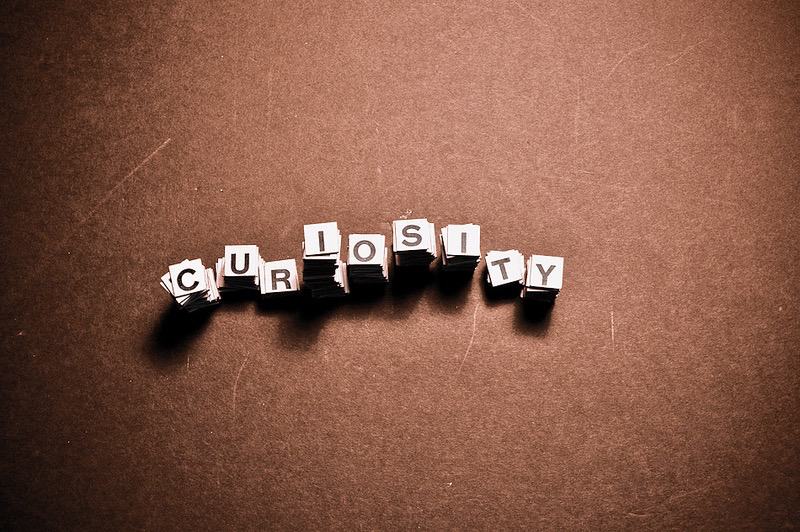
Currently I attend grad school and am learning about Marriage and Family Therapy. I got into this field because as I have worked with teens over the last eleven years in youth ministry I have bumped up against some pretty difficult circumstances facing people. I wanted to seek out and learn more about how I could help people in life. Basically I wanted to help people get out of their yuckiness or learn how to reframe those challenging things in life. placeholder;
One of the greatest lessons I have learned in all of my studies is to be curious. When I first heard it I thought it was ridiculous. I thought it was some kind of hocus-pocus or some kind of sage advice every self-respecting professor had to pass on. I was wrong.
I kept hearing about the need to be curious and over time I thought there might be something to this. So I started to look at my life and wonder about things more. I spent more time contemplating why things were the way they were. I wondered why so many things or people stayed the same. I wondered why I hadn’t made the changes in my own life. I really started digging deeper and pulling back the layers on everything in life.
The next thing I knew this natural curiosity within me sprung up and I went from challenging old thoughts I had to developing a whole new mindset. When I previously would not have engaged people in conversation I now find myself seeking conversation out and trying to learn more about people.
You see, we can all go deeper. We can all be more interested in people, or businesses, or other topics if we just start asking more questions.
Here’s how you can develop your curiosity:
1. Remind yourself every day and in every interaction to be curious.
This may sound silly but it has really helped me to be intentional about the practice of curiosity. The days I have forgotten to remind myself of this value are usually the days when I seem to have the least enjoyable interactions. This isn’t other people’s fault, it’s my own.
2. Give yourself permission to NOT know everything.
Again, this seems obvious. The problem is that too many of us feel like we SHOULD know everything. When I start feeling like I should know everything then I start to feel bad about myself in interactions and act like I DO know everything. You don’t need to know everything. You can’t know everything. So know what you know, share it with others, and ask them about stuff they know about.
3. Give yourself permission to ask questions.
Why do we need permission to ask questions? Because we act like we DO need permission. Quit waiting for other people to give you permission to ask questions and just start. You’ll notice that once you start asking questions then other people around you will ask questions. More likely they will agree with you that they were wondering the same thing. Now you’ve found some common ground with someone. When we have common ground with someone we are then more likely to engage them in even more discussion and possibly even friendship. Who doesn’t want that?
4. Remind yourself in each interaction with someone that every person has something they can teach you.
Each person has a vast array or knowledge or skills that you do not have. Why not actively look for those opportunities to learn more about them. When you start to see other people as an expert in the things that interest them you will quickly learn just how in depth people can talk about their interests. When they share this knowledge with you it adds to your own memory banks and can inform you in the future about various decisions facing you. Who knows, you might even get to pass that knowledge on to other people in the future.
5. Make a list of questions you can ask people…then keep adding to it.
I am full of ridiculous advice today. This one really is one of my favorites though. As someone who has struggled with thinking quickly I have realized that I can more fully engage in conversation if I have already thought through questions I want to ask. When I am planning on talking with someone I will review some basic questions I want to ask and this frees my brain up to think more deeply about other questions to ask. Also, when I have a basic repetoire of questions I can ask anyone I don’t get stumped when I find myself in front of people I didn’t know I would be meeting or know nothing about.
6. Start asking questions.
What good would it do if you took all my other tips and didn’t do anything with them? So you might as well just start asking away.
7. After you learn something you didn’t know before write it down in a notebook or on your computer.
Notice that I didn’t say “journal it?” This is because for some reason all throughout my life I have had some kind of weird aversion to the word journaling. Yet I retain the most knowledge when I actually write stuff down that I have learned or am thinking about. I also find that I write notes down all over the place, I don’t have a specific journal where I put everything. I keep notes in my Moleskine, on post-its, in two programs on my Mac (one is called Day One and the other is called nvAlt, on my phone, in Evernote, and by recording them when I need to quickly get them down. The main thing to remember is to process what you have learned and have a way to externalize those thoughts so you can refer back to them.
What strategies do you have for staying curious?
